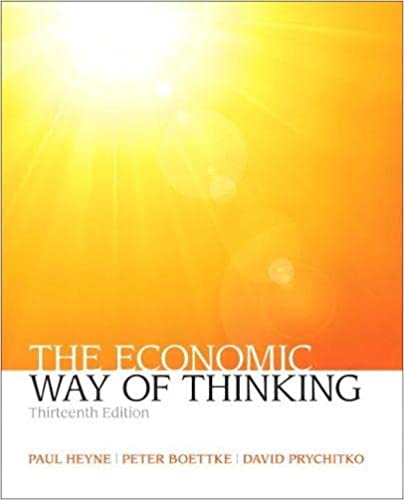
The Economic Way of Thinking 13th Edition by David Prychitko, Peter Boettke, Paul Heyne
Edition 13ISBN: 9780132992695
The Economic Way of Thinking 13th Edition by David Prychitko, Peter Boettke, Paul Heyne
Edition 13ISBN: 9780132992695 Exercise 12
What difference does ownership make? Go way back and take a look at question 9 at the end of Chapter 1. Then try to answer these questions:
(a) What response would you predict from the Sierra Club if an oil company requested a permit to extract natural gas from a wilderness area owned by the federal government?
(b) What difference do you think it would make to the Sierra Club's decision if the oil company were willing to pay an enormous royalty to the federal government because there was a great deal of natural gas available in that wilderness area?
(c) What difference do you think it would make if the oil company promised to extract the natural gas in ways that had a very small impact on the environment?
(d) What difference do you think it would make if the wilderness area, instead of belonging to the federal government, was the property of the Sierra Club?
(e) Why do you suppose the Audubon Society allows three oil companies to extract natural gas from its 26,800-acre Rainey Wildlife Sanctuary in Louisiana?
(f) The oil companies in the Rainey Sanctuary pay almost a million dollars per year in royalties to the Audubon Society. Do you think this arrangement promotes the purposes of the Audubon Society? Do you think itpromotes the well-being of natural-gas consumers? (The instructive story of the Rainey Sanctuary was told by economists John Baden and Richard Stroup in the July 1981 issue of Reason magazine.)
(g) Is it rational for the Audubon Society to allow extraction of natural gas from its own land while opposing it elsewhere?
Reference:
9. Have you ever noticed that the grounds of city-owned parks are often more polluted than those of country clubs?
(a) Is it simply because people who use parks are less concerned with pollution compared with those who golf? Is that even true?
(b) Might the property-rights assignments have something to do with it? Who owns the city park? Who owns the country club?
(c) Though their grounds are often impeccably clean, country clubs tend to use powerful fertilizers that eventually seep into and pollute the water table below, causing problems for others in the surrounding community. Who owns the water table?
(a) What response would you predict from the Sierra Club if an oil company requested a permit to extract natural gas from a wilderness area owned by the federal government?
(b) What difference do you think it would make to the Sierra Club's decision if the oil company were willing to pay an enormous royalty to the federal government because there was a great deal of natural gas available in that wilderness area?
(c) What difference do you think it would make if the oil company promised to extract the natural gas in ways that had a very small impact on the environment?
(d) What difference do you think it would make if the wilderness area, instead of belonging to the federal government, was the property of the Sierra Club?
(e) Why do you suppose the Audubon Society allows three oil companies to extract natural gas from its 26,800-acre Rainey Wildlife Sanctuary in Louisiana?
(f) The oil companies in the Rainey Sanctuary pay almost a million dollars per year in royalties to the Audubon Society. Do you think this arrangement promotes the purposes of the Audubon Society? Do you think itpromotes the well-being of natural-gas consumers? (The instructive story of the Rainey Sanctuary was told by economists John Baden and Richard Stroup in the July 1981 issue of Reason magazine.)
(g) Is it rational for the Audubon Society to allow extraction of natural gas from its own land while opposing it elsewhere?
Reference:
9. Have you ever noticed that the grounds of city-owned parks are often more polluted than those of country clubs?
(a) Is it simply because people who use parks are less concerned with pollution compared with those who golf? Is that even true?
(b) Might the property-rights assignments have something to do with it? Who owns the city park? Who owns the country club?
(c) Though their grounds are often impeccably clean, country clubs tend to use powerful fertilizers that eventually seep into and pollute the water table below, causing problems for others in the surrounding community. Who owns the water table?
Explanation
The ownership of any particular resource...
The Economic Way of Thinking 13th Edition by David Prychitko, Peter Boettke, Paul Heyne
Why don’t you like this exercise?
Other Minimum 8 character and maximum 255 character
Character 255


